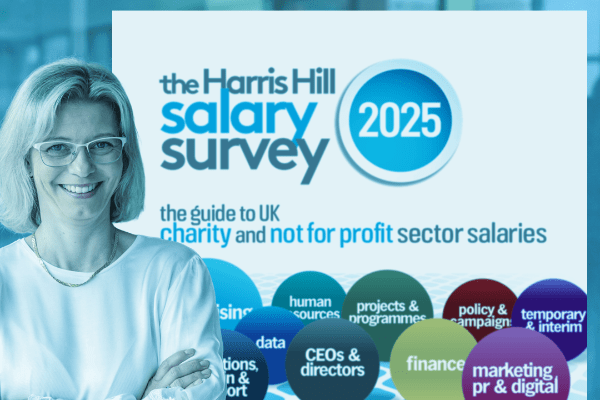Ever wish you were more assertive, when those 'few little requests' become a giant mountain of work? Our guest blogger, freelance writer and HR specialist Nicola Greenbrook has been finding out how, with insight from professionals in and out of the charity sector.

How to be assertive at work
Assertiveness is an essential workplace skill, but can be tricky to apply if you’re an introvert or have trouble speaking up.
Many of us avoid being more assertive through fear that our colleagues, and boss, will think badly of us. Yet, taking on 'just one more project' despite a full inbox can lead to over-work, over-tiredness and overwhelm - not to mention a dent in your personal life. So, how can we reclaim the power?
Should I be aggressive, passive or assertive?
First, let’s explore these different behaviours:
• Aggressiveness can be defined as ‘a determination to win or succeed, and the use of forceful action to do this’. Fictional fashion magazine editor Miranda Priestly is a wicked master of this.
• Passivity on the other hand is ‘acceptance of what happens, without active response or resistance’. Always going with the flow and yielding to other people’s demands can lead to burnout and resentment.
• Assertiveness falls somewhere between the two extremes. Not simply being calm, confident and firm with your convictions and decisions, being assertive is a state where you approach situations assuredly and objectively and are happy to seek feedback, aware of the growth and development it can bring. A satisfying compromise.

Assertiveness in the charity world
For people working in the third sector, the need to balance assertiveness with empathy - listening to service users, understanding their circumstances and inspiring action - can often be a particular challenge.
In a recent LinkedIn thread, the author had observed the number of women in her office who over-apologised (for getting into the lift, having the door held open for them or just taking up space). As part of the discussion, Garry Wilkinson, Head of Charity Partnerships at Vintage Cash Cow considered whether being a chronic apologiser isn’t necessary limited to women. ‘Maybe it’s also something to do with sorts of people who work in the Third Sector; they tend to be people with high levels of empathy and are very conscious of the feelings of others,’ he suggested.
Christina Grant, an executive coach and trainer for the fundraising sector has considerable insight in this area. She believes the fundraising role is fundamentally an influencing one. However, she observes that whilst her trainees are drawn to the sector by a desire to make a difference, limited budgets can often mean they lack adequate training or support in influencing and assertiveness.
Fundraising also attracts a high number of women. Yet senior teams, major donors and senior leaders in organisations remain predominately male-dominated - and so influencing is even more critical.
She believes the fundraiser has a challenging role, because in a first meeting with a donor or supporter, ‘they have to be seen as friendly and warm whilst also being authoritative, knowledgeable and credible’ so as to be trusted with a gift. Women also face even greater challenges at work when they start displaying assertive behaviours in the workplace which are then deemed as ‘bossy’ or overly aggressive.
So what can we do to address this?

The power of words
We’ve all heard people say ‘you need to be more assertive!’ But what if you can’t find the words or find yourself apologising instead?
Olivia Dunn, Head of Marketing and Communications at Halpin Partnership Ltd has observed women and men disempowering themselves with the words they use at work. In her insightful article ‘The shortcut to empowered communications’, she offers valuable advice on using emboldening language without bravado. Olivia suggests ditching ‘just’ (‘I’m just part-time’) and ‘I think’ which can dilute your point before you’ve even made it. She makes a compelling argument; it’s not the words you add in but the ones you remove which can empower you.
Why it's win-win to be assertive at work
Being professionally assertive can increase your self-confidence and lower your anxiety and dependency. It can also help you stay in control and communicate more effectively and healthily.
A graphic designer from London shared with me how assertiveness worked for them:
‘Last year I worked on a particularly messy job for a lovely client.’ they explained. ‘Remaining assertive throughout the project meant the experience for both me and my client remained positive - even when the project became a source of stress. The feedback at the end of the job was that I handled things with grace’.
Setting clear boundaries about what they were OK with in their own mind before conveying them externally, as well as taking control when requests from clients or others feel ‘too much’, was a useful strategy for them:
‘Instead of saying ‘no’ and explaining why I can’t do what they want, I try to respond positively. I explain what I CAN do and when, or I pass them on to someone who may be able to help, instead of giving the impression they’re inconveniencing me. If someone ignores or shuts down my assertiveness with a passive-aggressive response (including no response), I’ve learnt to let it go, move on and find people to work with who are a much better fit.’

How to be assertive!
Assertiveness may not be an innate characteristic for everyone, but it can be learned and developed.
Christina Grant emphasises the importance of body language and gestures in key meetings, especially when making first impressions. She explains, ‘For example, it’s important for women to seat themselves in prime spots in a meeting room and to be present in the room physically’.
She points out that seemingly little things can affect this; being overly concerned about everyone's comfort and refreshments or taking responsibility for taking notes when no one else does. ‘This can sometimes damage our own credibility without us realising it (although if a woman has enough confidence she could take notes and make tea and it would not have an impact on how she is perceived)’ Christina explains.
She also encourages women to ‘open’ meetings with a two-minute, strong introduction, to ensure other attendees know they're ‘leading’ the meeting and will sense their authority. ‘It should help other people to relax and feel confident that you have a plan and you're in control - not in an aggressive way, but rather a signal that you’re confident in your world’.
Here are some final strategies on being assertive at work:
• Practice outside of work first. Build up your assertiveness muscle; speak up about bad service or ask for the table you want at a restaurant.
• Set clear boundaries. Career and business coach Nathalina Harrison likens good assertiveness to good parenting. Put clear boundaries in place on how you want to be treated and communicated with and be clear about the consequences if they’re not adhered to, whether upwards (your manager and stakeholders), sideways (your peers) and downwards (your direct reports).
• Be analytical. If you want to be assertive but you're hesitant and reluctant to speak up, do a quick analysis of the situation. What’s the worst that could happen?

______________
Assertiveness is an invaluable skill. It can bolster your career progression, improve your visibility and credibility in meetings and strengthen relationships with colleagues, clients and contacts. Being confident in your approach, removing disempowering words and setting clear boundaries will ensure you nail it at work.
I’m certain you’ll like your assertive (not aggressive) self a lot better than the passive, exhausted resentful one and soon that mountain of work won’t look so daunting. Just don’t be Miranda Priestly, OK? That’s all.
Nicola Greenbrook - HR Specialist and Freelance Writer
Contact Nicola, or check out her website.

More from Nicola Greenbrook
 | | |
 | |
|
-

Opportunity for all
Find out how we’re working to deliver more diverse, equitable and inclusive recruitment…
-

Recruiting a charity CEO?
Our executive recruitment specialists have an exceptional record of successful CEO, chair, trustee and…
-

Charity sector salaries
Our 2025 Salary Survey has the latest rates and expert insight for roles throughout the sector.













